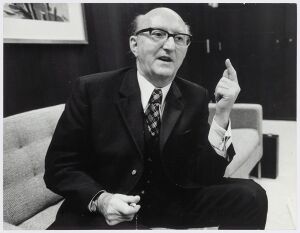Otmar Emminger
( central banker, economist) | ||||||||||||
|---|---|---|---|---|---|---|---|---|---|---|---|---|
 | ||||||||||||
| Born | 2 March 1911 Augsburg | |||||||||||
| Died | 3 August 1986 (Age 75) Manila, Phillipines | |||||||||||
Cause of death | ||||||||||||
| Nationality | German | |||||||||||
| Alma mater | • University of Munich • London School of Economics | |||||||||||
| Member of | Group of Thirty | |||||||||||
German economist. President of the German Bundesbank in the late 1970s
| ||||||||||||
Otmar Erich Anton Emminger was a German economist and President of the German Bundesbank from July 1, 1977 to December 31, 1979.
Early Life
The son of the lawyer and politician Erich Emminger, he studied law and economics in Berlin, Munich, Edinburgh and at the London School of Economics from 1928 to 1932. Both in Berlin and Munich he was a member of catholic student unions. After his first legal state examination in 1931, he first became a trainee lawyer, but interrupted his legal preparatory service to study in Great Britain and in 1934 as a research assistant in Berlin and from 1935 to 1936 at the German Institute for Economic Researchto work. In December 1934 Emminger had already completed his doctorate at the Munich State Economics Faculty, became a trainee lawyer again in 1936 and passed the assessor examination in 1938. He joined the Nazi Party in the 1937. In World War II he was in the Air Force of the Armed Forces and was promoted to Lieutenant on September 1, 1942. In March 1945 he was a captain in the staff of the 11th Flak Division and aide to the division commander.
After becoming a POW, he became an employee of the Bavarian Economic Working Group in 1945 and, in 1947, senior councilor in the Bavarian Ministry of Economic Affairs. In 1949 he took over the economic department of the German delegation to the European Economic Council in Paris (OEEC), today's OECD. At the end of 1950, the Bank deutscher Länder in Frankfurt (the predecessor institution of the Deutsche Bundesbank) asked him to join their service. In the spring of 1951 he took over the management of the Economics and Statistics department.
From March 1953 to 1969 Emminger was a member of the board of directors, first of the Bank deutscher Länder, then the Bundesbank. From 1969 to 1977 he was its vice-president. From July 1, 1977 to December 31, 1979 he was President of the Bundesbank.
From 1958 to 1977 he was Vice President and temporarily also President of the Currency Committee of the EEC (European Economic Community).
Emminger campaigned consistently for the stability of the Deutschmark (DM), he fought against the massive dollar inflows from the USA ("dollar glut") and insisted on the Bundesbank's strict independence from the government. The Bundesbank only gave its approval for the European Monetary System (EMS) after it had implemented significant changes. This decision was not an easy one for Emminger; in his dissertation he had already dealt with the introduction of flexible exchange rates and later helped to shape the separation of exchange rates from the dollar standard himself.
Emminger was an influential representative of the Bundesbank; his international experience and rhetorical talent probably contributed to this. Because he consistently advocated the price stability of the DM and the independence of the Bundesbank, he was called "Mister DM" abroad.
On June 30, 1977, Karl Klasen went into retirement[1]; he had been President of the Bundesbank since 1969. Emminger became his successor; he was followed on January 1, 1980 by Karl Otto Pöhl.
In July 1986 Emminger traveled to Manila on behalf of the Federal Government (Kohl II cabinet), where he wanted to make his monetary policy experience available to President Corazon Aquino. There he died of heart failure.
Event Participated in
| Event | Start | End | Location(s) | Description |
|---|---|---|---|---|
| Bilderberg/1965 | 2 April 1965 | 4 April 1965 | Italy Villa d'Este | The 14th Bilderberg meeting, held in Italy |